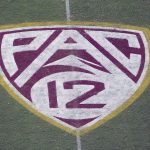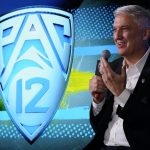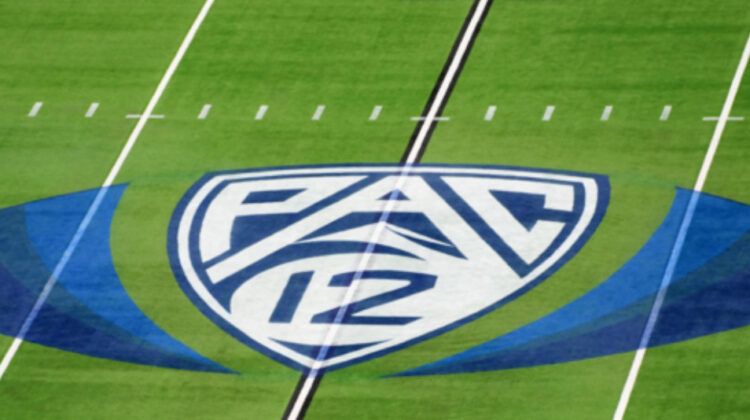1. Wizard of the Wasatch
The Pac-12 will announce its all-conference team and postseason award winners in early December, a few days after the conference championship game.
How about we go ahead and pencil in Utah’s Kyle Whittingham for Coach of the Year.
Yes, there’s a half-season to play.
Sure, Washington is undefeated; coach Kalen DeBoer has done first-rate work with the Huskies.
And once again, Oregon State’s Jonathan Smith is doing as much with his personnel as any coach in the country.
Let’s not ignore Arizona’s Jedd Fisch and Colorado’s Deion Sanders; both schools are exceeding expectations.
But has any coach anywhere applied his craft with the complete mastery Whittingham has shown through the first eight weeks?
The Utes are 6-1 overall and tied for second place in the conference (in the loss column) and have been without their starting quarterback all season.
Same with their best all-around tailback.
And their all-conference tight end.
And an assortment of other impact players.
Yet somehow, they just beat USC 34-32 in the Coliseum on a last-second field goal with a quarterback (Bryson Barnes) who was a walk-on until recently and a tailback (Sione Vaki) who usually plays safety.
It was their third victory over USC in the past 53 weeks.
After the game, Whittingham went public with the worst-kept secret in the conference: quarterback Cam Rising, winner of the past two Pac-12 championship games, will miss the rest of the season due to a prolonged recovery from knee surgery.
So will tight end Brant Kuithe.
The Utes are also without gifted tailback Micah Bernard and wideout Mycah Pittman. And there are others.
No team has sustained as many injuries at the skill positions.
But therein lies the brilliance of Whittingham’s system. The Utes are built the old-fashioned way: from the inside out. The offensive and defensive lines have always been the pillars of the program, which is why they can beat Florida and Baylor and UCLA without Rising and Co.
They are all grit and resolve and willpower and moxie.
It’s why they can saunter into the Coliseum with a quarterback who only recently was placed on scholarship and beat a team with a quarterback who won the Heisman Trophy.
Whittingham has produced a bevy of quality teams in his 12 years in the Pac-12 and owns two conference Coach of the Year awards.
He has led the Utes through the transition to the Pac-12, through many gut-wrenching losses and through the deaths of two players.
But this … this stands as his tour de force.
2. The anti-Utah
In the other corner, ladies and gentlemen, we present the University of Southern California Trojans.
A team built from the outside in.
A team with terrific skill-position talent but weak lines of scrimmage and an undisciplined defense.
If the Utes are more than the sum of their parts, then the Trojans are less.
And after Saturday night, the Trojans have two losses, no shot at the College Football Playoff and, in our view, little chance to qualify for the Pac-12 championship game.
Not with Oregon and Washington and UCLA left on the schedule.
USC (6-2/4-1) is more likely to finish with four losses than play for the conference title.
Let’s not forget that the narrow loss to Utah and the blowout defeat at Notre Dame last weekend were preceded by close calls against Arizona and Colorado.
Inside the Trojan Horse, it seems, lies a paper tiger.
3. Bad loss, worse message
The leader of the wayward Trojans, of course, is Mr. Lincoln Michael Riley, a 40-year-old with a brilliant offensive mind and, it often seems, little regard for defense.
But Riley’s coaching skills are not the topic of this discussion.
Instead, let’s address his management of the USC program and role as the leader and molder of young men.
Following the gut-punch loss to Utah, Riley declined to make any of his players available to the media for post-game interviews.
That would be just fine if the Trojans also were not available for postgame interviews after victories. But, well, they are available after victories.
The Hotline never, ever addresses post-practice or post-game media access policies because, frankly, fans don’t care about the challenges reporters face. (Nor should they.)
And we aren’t offering comment here because of the impact Riley’s hardball approach had on the reporters who covered the game.
In our view, Riley is doing his own players a disservice by creating two sets of rules: Talk to the media after wins but not after a difficult loss.
That sends the wrong message. Learning to deal with the media when times are tough is more valuable than dealing with the media when times are good. The former builds character and teaches accountability. The latter lights the path to the easy way out.
Arizona State’s players are having a pretty tough season. They aren’t playing for a bowl berth, haven’t won since the season opener and just suffered a gut-punch loss in Seattle against the No. 5 team in the land.
How many times have ASU’s players been walled off from the media after losses? Zero.
Selective accountability doesn’t work. Either you hold players to a certain standard in every regard — including the public-facing aspect of playing football for USC — or you don’t bother with standards in any regard.
Hopefully, this was a one-time decision and USC’s players will be offered the opportunity to interact with the media after other losses this season (because there will be more losses).
If Riley thinks sealing his players off from the media is hurting the media, he’s grossly mistaken. The reporters will be just fine. (One could argue he’s helping the press by creating a narrative about his management of the program. Scrutiny on the head coach always sells.)
In situations like this, the players are the losers. Let them face the press. Let them answer the tough questions. Let them learn the value of accountability. Let them learn to communicate. Let them be vulnerable.
It will serve them well for the rest of this season, and for life.
4. Escape on Montlake
The light Pac-12 schedule in Week 8 produced two blowouts (UCLA over Stanford and Oregon over Washington State) and two tight games.
We addressed Utah’s narrow victory over USC above. The day’s other riveting affair unfolded in Seattle, where Arizona State nearly produced the upset of the year in college football.
The Sun Devils were 26.5-point underdogs against the mighty Huskies but led 7-6 early in the fourth quarter and were driving for a touchdown when UW cornerback Mishael Powell’s 89-yard Pick Six changed the game and saved UW’s season.
The Huskies held on for a 15-7 victory that extended their winning streak to 14 games.
Their last loss was Oct. 8, 2022, to Arizona State.
We expected a hangover on Montlake after the epic victory over Oregon, but this was even closer than imagined thanks to four turnovers by UW.
Quarterback Michael Penix threw two interceptions and looked nothing like a Heisman Trophy frontrunner. (Nor, for that matter, did USC’s Caleb Williams.)
But instead of focusing on UW’s performance, let’s note the effort put forth by Arizona State, which is playing for nothing except pride and has shown plenty of that under coach Kenny Dillingham.
Handed a postseason ban by the administration days before the season opener, the Sun Devils gave USC more than it expected, played Cal to a three-point game, pushed Colorado to the brink and nearly stunned the undefeated Huskies.
ASU has the worst record in the conference, but the effort level has been stellar on a weekly basis.
5. A look ahead
The Pac-12 will be the epicenter of college football on November 11, when Utah visits Washington and USC ventures to Oregon.
The conference is expected to announce the kickoff times and TV networks for the two showdowns on Monday. Unless it doesn’t.
Fox and ESPN typically pick their games 12 days ahead of kickoff, but each network has the option to use two six-day selection windows per season.
Thus far, they haven’t used any, which means each of the final four Saturdays could be subject to six-day picks in which fans don’t learn the kickoff time until the Sunday before the game.
We suspect Fox and ESPN will use a six-day option for Nov. 11.
But because of the top-heavy nature of the conference schedule that day, the Pac-12 might be in position to release the kickoff times for the other four games on Nov. 11 with use of the 12-day option — this Monday, in other words.
Related posts:

(AP Photo/Ralph Freso, File)
Wilner Hotline: Sun Devils Missing in Action, Week 10 Pac-12 Picks
(AP Photo/Ralph Freso, File)
Wilner Hotline – One Month Until Football Signing Day, Pac-12 is Struggling
(AP Photo/Marcio Jose Sanchez)
Pac-12 media rights: Finish line in sight? Interpreting the latest comments from university presidents (and a notable internal development)
(AP Photo/Marcio Jose Sanchez)
Pac-12 media rights: Six extreme scenarios worthy of consideration as the saga hurtles toward a conclusion (maybe)
